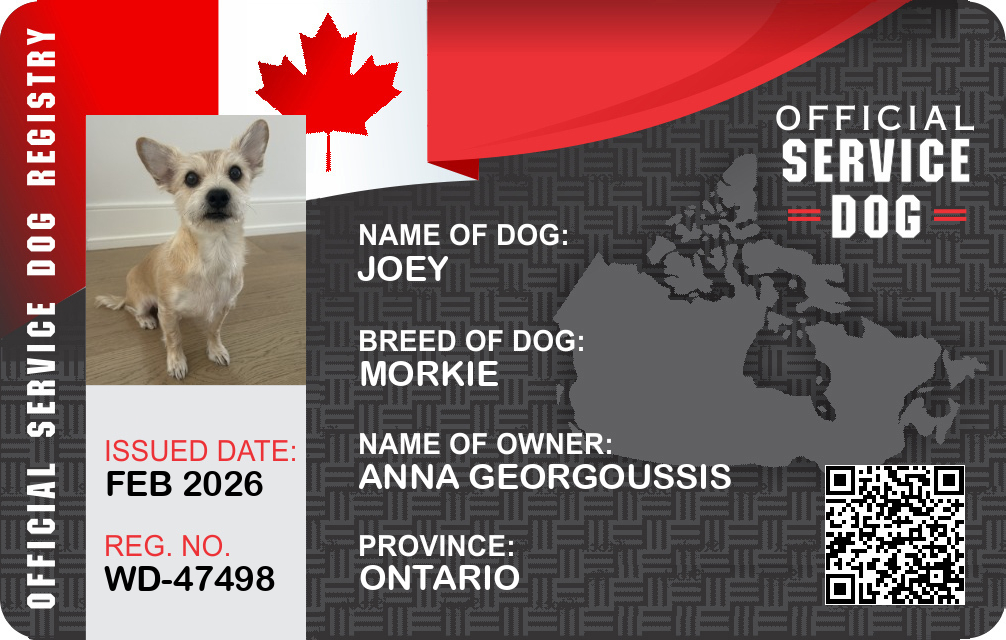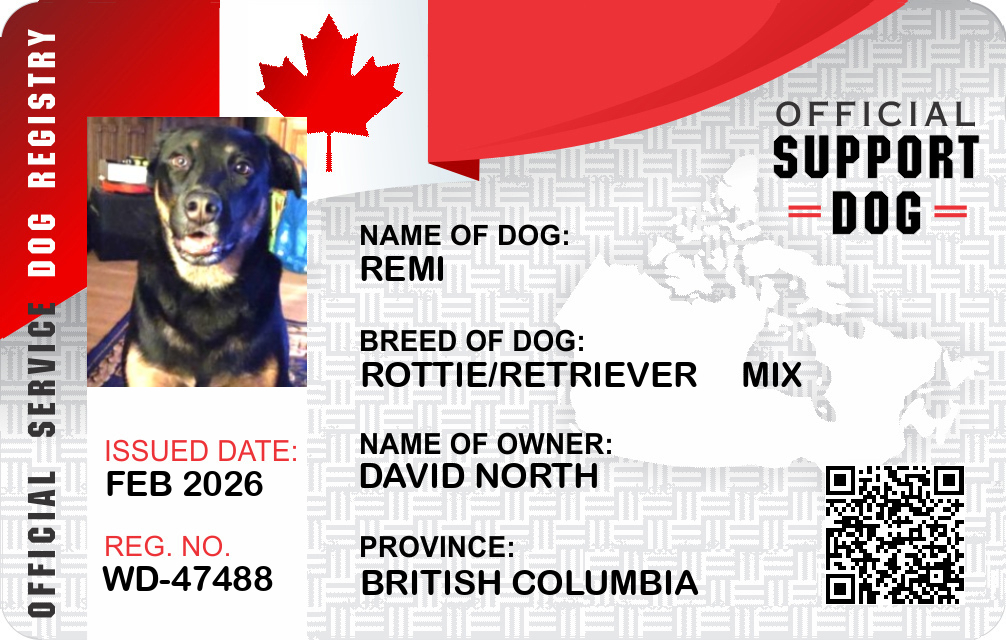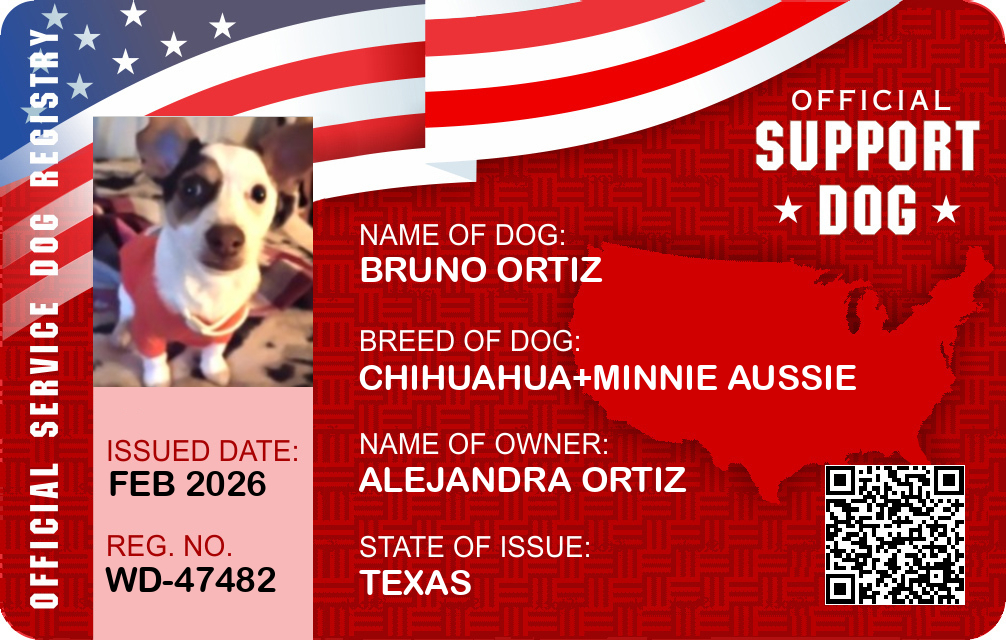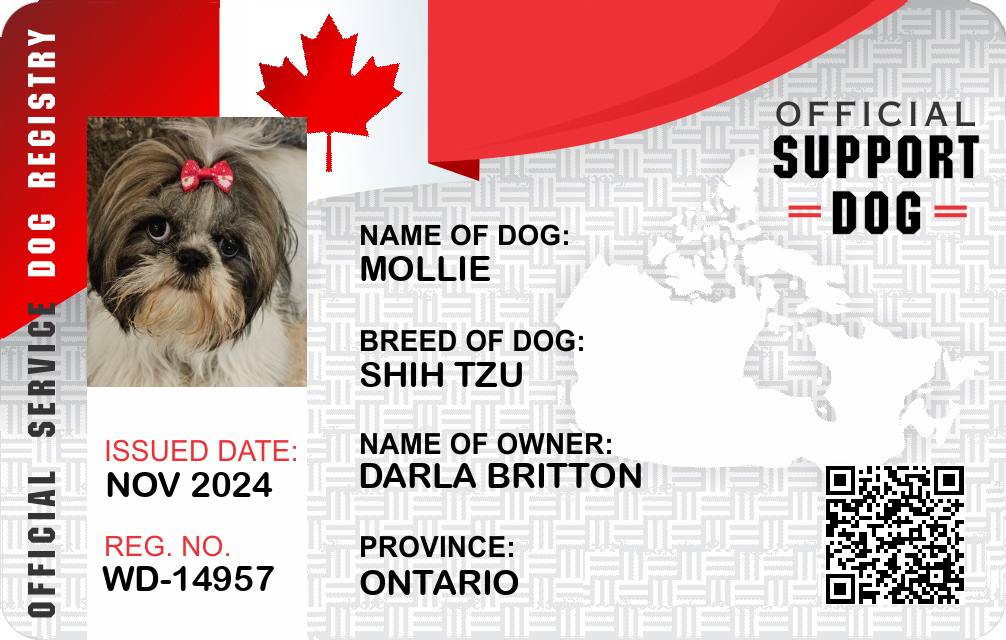Alabama Service Dog Laws
Get Your Documents
Example State Cards


Overview of Service Dog and Legal Definitions in Alabama
Understanding the legal framework surrounding service dogs is crucial for handlers in Alabama. The state follows federal guidelines, which provide the foundation for defining service dogs and set forth their legal recognition.
What is a Service Dog?
A service dog is defined under the Americans with Disabilities Act (ADA) as a dog that has been individually trained to perform tasks or do work for a person with a disability. These tasks must be directly related to the person’s disability, such as guiding a visually impaired person, alerting a person with hearing loss, pulling a wheelchair, or providing assistance during a seizure. The key component is the specific training the dog receives to carry out tasks that mitigate the handler’s disability.
How Service Dogs Differ from Other Types of Assistance Animals
Service dogs are distinct from other types of assistance animals such as emotional support animals and therapy animals. Emotional support animals provide comfort with their presence but are not trained to perform specific tasks, and therefore are not covered by the ADA’s public access rights. Therapy animals are typically used to provide therapeutic benefits in settings like hospitals or schools and do not have the same access rights as service dogs. This distinction is essential in understanding service dog regulations and the rights afforded to their handlers.
Key Federal Laws Affecting Service Dogs
Several federal laws intersect with Alabama’s regulations concerning service dogs, primarily:
- Americans with Disabilities Act (ADA): The ADA mandates that service dogs are allowed in public accommodations unless their presence fundamentally alters the nature of services provided or poses a direct threat.
- Fair Housing Act (FHA): The FHA requires housing providers to allow reasonable accommodations for service animals and emotional support animals, ensuring equal access to housing.
- Air Carrier Access Act (ACAA): This act ensures that service dogs can accompany their handlers on flights without additional fees, though airlines may have procedures regarding documentation and access.
State-Specific Service Dog Laws in Alabama
In Alabama, state regulations complement federal laws to ensure a comprehensive framework for the rights of service dog handlers. State-specific adjustments address nuances in public access and discrimination prevention.
Housing Rights and Responsibilities
Under the FHA and adopted state guidelines, individuals with disabilities are entitled to live with their service animals in housing units, even those with no-pet policies. Housing providers must accommodate service animals without imposing additional fees, though they may request documentation demonstrating the need for the animal.
Public Access and Accommodation
In Alabama, public facilities are required by the ADA to allow access to service dogs. This access includes restaurants, hotels, stores, and public transportation. Service dogs must remain under control and behaved, although minor disruption is not grounds for exclusion unless it fundamentally alters service delivery or compromises safety.
Transportation and Travel Rules
Public transportation in Alabama must be accessible to service dogs and their handlers under ADA regulations. Beyond, the ACAA ensures that air travel accommodates service dogs, though handlers should check with airlines for specific requirements regarding behavior and health certifications.
Employment and Workplace Considerations
Employers in Alabama are required by the ADA to provide reasonable accommodations for employees with disabilities, including allowing service dogs at work. Employers can request documentation to confirm the necessity of the service dog related to the employee’s role but must maintain confidentiality and non-discriminatory practices.
Documentation, Requirements, and Processes in Alabama
The legality of service dog compliance often intersects with practical documentation procedures to prevent discrimination and ensure rights are respected.
Service Dog Documentation and Who Can Issue It
While the ADA does not require certification for service dogs, handlers might consider keeping health documentation, vaccination records, and identification cards. These documents, although not legally mandated, can facilitate smoother interactions in housing and travel.
Landlord, Business, and Provider Verification Rules
Verification processes vary by context. For housing, landlords may request proof of necessity, often in the form of a letter from a healthcare provider. Similarly, businesses can ask whether the dog is a service animal needed due to a disability and the tasks it is trained to perform.
Rights, Limitations, and Legal Risks
While Alabama supports the rights of service dog handlers, understanding the boundaries of these rights and the consequences of misrepresentation is crucial.
Rights Service Dog Handlers Have in Alabama
Service dog handlers in Alabama enjoy rights that include:
- Unrestricted access to public places
- Equal housing rights under FHA
- Non-discriminatory treatment in employment settings
Limits on Service Dog Protections and Common Restrictions
However, there are limitations, such as:
- Dogs that are aggressive or not under control can be excluded.
- Service dogs can be refused entry if their presence disrupts the core operation of a business or service.
Penalties for Fraud or Misrepresentation
Misrepresenting a pet as a service dog is illegal and potentially subject to fines and other legal penalties. This regulation helps maintain public trust and the integrity of service dog programs.
Practical Guidance for Service Dog Handlers in Alabama
Navigating the laws around service dogs involves both understanding rights and effectively advocating for them.
How to Qualify for a Service Dog Legitimately
To qualify, individuals need a disability requiring task assistance. Connections with legitimate training organizations can facilitate this, emphasizing the importance of partnering with registered entities to avoid fraudulent scenarios.
How to Talk to Landlords, Airlines, and Employers
Being prepared with documentation, understanding one’s rights, and maintaining open communication are vital for discussing needs with landlords, airlines, and employers. It reduces misunderstandings and reinforces compliance with laws.
Summary of Service Dog Laws in Alabama
To maintain compliance and advocacy for rights in Alabama, service dog handlers should:
- Understand Federal and State Definitions: Recognize the differences in animal designations and align with legal definitions of service dogs.
- Engage with Verification Processes: Be proactive in displaying any documentation, even if not legally required, to ease interactions.
- Educate on Access Rights and Responsibilities: Know where service dogs are permitted and under what circumstances they might be excluded.
- Be Aware of Fraudulent Implications: Recognize the legal repercussions of misrepresentation to avoid unnecessary penalties.
- Communicate Effectively: Prepare dialogue that educates landlords, airlines, and employers on service dog requirements and laws.
By adhering to these guidelines, service dog handlers in Alabama can effectively uphold their rights and contribute to a more inclusive society for individuals with disabilities.
Get Your Documents
Example State Cards













